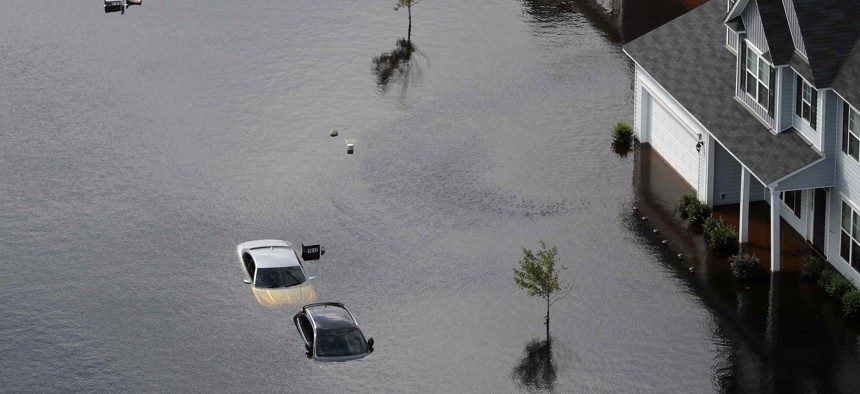White House Snubs Disaster Relief Funds Proposed in House Bill

Cars are submerged in a neighborhood in the aftermath of Hurricane Florence in Fayetteville, N.C., Monday, Sept. 17, 2018. AP Photo/Gerald Herbert

Connecting state and local government leaders
The $14 billion package lawmakers passed this week appears to be going nowhere fast—at least for now.
The Trump administration is dismissing the need for billions of dollars in additional aid for places around the U.S. hit by natural disasters.
House lawmakers proposed providing the money in a bill the chamber passed on Wednesday with mostly Democratic votes. The legislation calls for a range of funding, like $600 million in food assistance for Puerto Rico and $1.1 billion for crop and livestock losses.
In total it outlines $14.17 billion in supplemental appropriations for expenses tied to natural disasters, including hurricanes, wildfires, and the eruption last year of Hawaii’s Kilauea volcano.
Senate lawmakers are not expected to take up the bill, which is tangled in a fight between President Trump and Democrats over Trump’s call for $5.7 billion for a wall on the nation’s southern border with Mexico. That conflict has led to a partial government shutdown.
Packaged with the disaster relief measure was a “continuing resolution” to reopen parts of the government, at least temporarily, by providing funding through Feb. 8.
The partial shutdown was in its 27th day on Thursday.
Places that would be eligible for aid in the bill include those affected by Hurricane Florence, like North Carolina, and Hurricane Michael, which plowed through the Florida panhandle. Programs in the bill would also cover costs from wildfires, such as those in California.
“While the Administration supports the provision of efficient and effective disaster relief to impacted communities and agencies, it is concerned that the bill includes funding that is unnecessary, excessive, premature, and duplicative,” the White House Office of Management and Budget said in a Jan. 16 statement of administration policy.
“The Congress should not use natural disasters as a pretext to engage in unnecessary spending outside of the agreed-upon discretionary spending caps,” it added.
In a reference to the ongoing dispute over the wall, OMB also noted that “The only supplemental appropriations the Administration is seeking at this time are those that would address the ongoing security and humanitarian crisis along the southern border.”
House Appropriations Chairwoman Nita Lowey was traveling Thursday afternoon. But Evan Hollander, the committee’s communications director, said in an email that the bill “funds the basics of disaster relief and recovery,” like nutrition and medical needs and rebuilding damaged infrastructure.
“Instead of helping our fellow citizens recover from these disasters, it appears President Trump is once again playing politics,” he added.
The bill follows a series of destructive and costly storms, floods and wildfires that have struck various parts of the U.S.
Events like Hurricane Harvey that left Houston swamped by flooding in 2017, Hurricane Maria, which ravaged Puerto Rico that same year, and the deadly Camp Fire, in northern California, which decimated the town of Paradise in late 2018.
Lawmakers have passed, and the president has signed, a string of funding measures in the wake of recent disasters. Between September 2017 and October of 2018, Congress approved four disaster relief supplemental appropriations bills, totaling around $137 billion, according to information from the Congressional Budget Office.
Earlier this month, the Trump administration floated tapping some of this already appropriated disaster funding to build the border wall. But the president reportedly has since backed off that idea, along with declaring a national emergency to construct the barrier.
The four-page statement of policy that OMB issued walks through a number of specific concerns the administration has about the latest supplemental appropriations package.
For instance, it calls $600 million for Puerto Rico’s Nutrition Assistance Program “excessive and unnecessary.” The program is similar to the Supplemental Nutrition Assistance Program, which is available in states across the U.S. and sometimes referred to as food stamps.
Email and phone messages seeking a response from the Puerto Rico Federal Affairs Administration on Thursday went unreturned.
The administration also objects to $150 million for housing, water, wastewater and community facility programs through the U.S. Department of Agriculture’s rural development division, saying it duplicates funding available through the annual budget process.
And it rejects the need for $849 million for water and sewer project financing programs known as “state revolving funds,” saying a $500 million chunk for areas affected by Hurricanes Harvey, Irma and Maria would go to work beyond "normal core response activities," including projects to address future flood risks and vulnerabilities.
The remainder of the revolving fund money, the administration says, is unnecessary given support that’s already flowing from the Federal Emergency Management Agency.
Disaster recovery Community Development Block Grants worth $1.2 billion that the bill proposes are also unwarranted, the statement of administration policy says. Those grants are overseen by the Department of Housing and Urban Development.
Six Republicans joined 231 Democrats in voting for the bill in the House, while 187 Republicans and zero Democrats voted against it.
About $2.5 billion of the money the bill would provide is for “resiliency” initiatives meant to help reduce the risk of damage in future disasters, according to House Appropriations Democrats.
North Carolina Gov. Roy Cooper, a Democrat, described the legislation as “critical to North Carolina’s recovery from Hurricane Florence.” He wrote a letter to Trump last week saying that the government shutdown was slowing down recovery efforts in the state.
The state was notified of a $168 million grant award last April, Cooper said. Offering an example how the shutdown is causing delays, he added that the state can’t use that money until HUD publishes guidance. Right now the agency is among those that is closed.
Bill Lucia is a Senior Reporter for Route Fifty and is based in Washington, D.C.

NEXT STORY: Is State and Local Cybersecurity Maturing Fast Enough?





